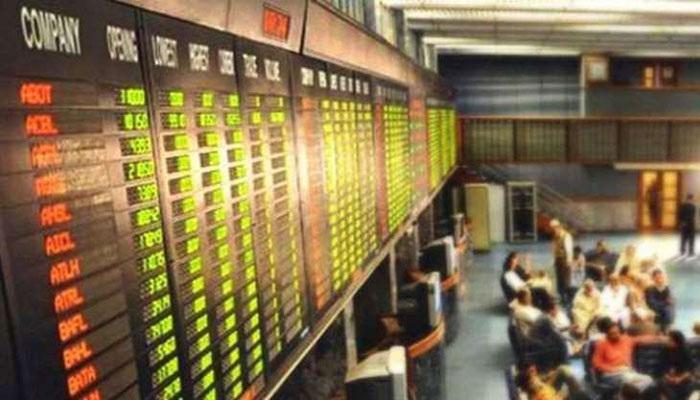Stocks to bet on PSDP-led cyclical boom
KARACHI: Stocks are seen swinging up ahead betting on higher Public Sector Development Programme (PSDP) allocation led cyclical sector boom, dealers said.
The KSE-100 Shares Index at Pakistan Stock Exchange closed at 47,686 points, up 0.2 percent or 83 points week-on-week.
Brokerage Arif Habib Limited in its weekly stock review said the market was expected to perform well in FY22 on account of robust earnings growth forecast of cement, steel and allied sectors amid strong cyclical demand driven by historic high PSDP allocation and focus on Naya Pakistan Housing scheme, expectation of an Auto and Refinery policy, downwards sticky oil prices supporting the E&P sector, and commencement of monetary tightening, which should once again garner interest in commercial banks.
The market also gained momentum on the first day of the new fiscal year, erasing previous losses.
Average volumes arrived at 622 million shares, down 10 percent week on week, while average traded value settled at $107 million, down 4 percent week-on-week.
The market remained range-bound during the week with volatile trading on account of June-end closing and adjustment of portfolios. Moreover, as the debate on the Federal Budget moved towards final stages in the Parliament, some stiffness was witnessed in the political climate. Nevertheless, the budget was passed with a majority vote.
Foreign selling continued this week, clocking-in at $8.4 million compared to a net sell of $7.9 million last week. Selling was witnessed in commercial banks ($3.2 million) and other sectors ($1.4 million).
On the domestic front, major buying was reported by individuals ($13.6 million) and companies ($13.4 million).
Power sector’s circular debt affected the market sentiment, which reached up to Rs2.380 trillion by April 2021. For payment of circular debt, the IMF has allowed 10 percent provision in budget to be included as “circular debt surcharge” whereas the Finance Minister Shaukat Tarin has suggested to reduce it by growing demand of electricity through industrial growth in 6 to 7 years.
“Sustaining a time bomb for 6 to 7 years is not appropriate, it will not only include heavy interest added to countries annual debt servicing repayments but also the ever-increasing burden of debt,” said Ateeq Ur Rehman, an economic and financial analyst.
“This is a serious matter. The government should identify and rectify the defects and go for a solution for stopping the circular debt to further pile up and abstain from passing on this burden to consumers or common men.”
“We are highly taxed electricity consumers in the region. Relief by the government on electricity tariff will reduce the extreme financial hardships faced by human lives in the country,” Rehman added.
Sector-wise positive contributions came from technology (105 points), pharma (68 points), food and personal care (51 points), tobacco (22 points), and insurance (14 points). Whereas, the sectors that contributed negatively were commercial banks (46 points), power generation & distribution (44 points), oil & gas exploration companies (39 points), oil & gas marketing (36 points) and refineries (18 points).
Scrip-wise positive contributors were TRG (88 points), AGP (54 points), LUCK (41 points), UNITY (37 points) and MEBL (25 points). Scrip-wise negative contributors were HBL (67 points), HUBC (65 points), UBL (38 points), OGDC (35 points), and HASCOL (34 points).
-
 Kelly Clarkson Ready To Date After Talk Show Exit?
Kelly Clarkson Ready To Date After Talk Show Exit? -
 Is AI Heading Into Dangerous Territory? Experts Warn Of Alarming New Trends
Is AI Heading Into Dangerous Territory? Experts Warn Of Alarming New Trends -
 Google Updates Search Tools To Simplify Removal Of Non-consensual Explicit Images
Google Updates Search Tools To Simplify Removal Of Non-consensual Explicit Images -
 Chilling Details Emerge On Jeffrey Epstein’s Parties: Satanic Rights Were Held & People Died In Rough Intimacy
Chilling Details Emerge On Jeffrey Epstein’s Parties: Satanic Rights Were Held & People Died In Rough Intimacy -
 50 Cent Gets Standing Ovation From Eminem In New 'award Video'
50 Cent Gets Standing Ovation From Eminem In New 'award Video' -
 Bad Bunny Delivers Sharp Message To Authorities In Super Bowl Halftime Show
Bad Bunny Delivers Sharp Message To Authorities In Super Bowl Halftime Show -
 Prince William 'worst Nightmare' Becomes Reality
Prince William 'worst Nightmare' Becomes Reality -
 Thai School Shooting: Gunman Opened Fire At School In Southern Thailand Holding Teachers, Students Hostage
Thai School Shooting: Gunman Opened Fire At School In Southern Thailand Holding Teachers, Students Hostage -
 Britain's Chief Prosecutor Breaks Silence After King Charles Vows To Answer All Andrew Questions
Britain's Chief Prosecutor Breaks Silence After King Charles Vows To Answer All Andrew Questions -
 Maxwell Could Get 'shot In The Back Of The Head' If Released: US Congressman
Maxwell Could Get 'shot In The Back Of The Head' If Released: US Congressman -
 New EU Strategy Aims To Curb Threat Of Malicious Drones
New EU Strategy Aims To Curb Threat Of Malicious Drones -
 Halle Berry On How 3 Previous Marriages Shaped Van Hunt Romance
Halle Berry On How 3 Previous Marriages Shaped Van Hunt Romance -
 Facebook Rolls Out AI Animated Profile Pictures And New Creative Tools
Facebook Rolls Out AI Animated Profile Pictures And New Creative Tools -
 NHS Warning To Staff On ‘discouraging First Cousin Marriage’: Is It Medically Justified?
NHS Warning To Staff On ‘discouraging First Cousin Marriage’: Is It Medically Justified? -
 Andrew Mountbatten-Windsor Flew Money In Suitcases To Launder: New Allegation Drops
Andrew Mountbatten-Windsor Flew Money In Suitcases To Launder: New Allegation Drops -
 Nancy Guthrie Abduction: Piers Morgan Reacts To 'massive Breakthrough' In Baffling Case
Nancy Guthrie Abduction: Piers Morgan Reacts To 'massive Breakthrough' In Baffling Case




